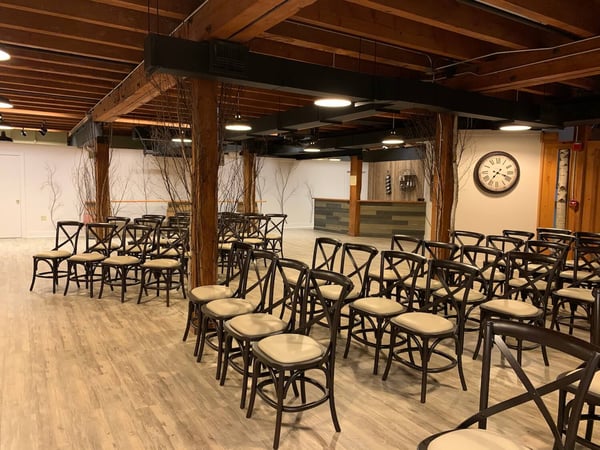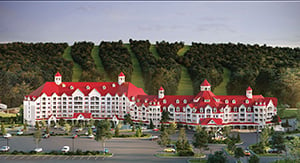7 min read
Re-Emergence of Corporate Retreats: Strategy for a Changing Workforce
![]() Allan Guilbeault
:
Jan 14, 2020 3:51:32 PM
Allan Guilbeault
:
Jan 14, 2020 3:51:32 PM
As the struggle to hire and retain a talented workforce increases, innovative companies look for new ways to keep employees engaged, motivated and content.

A new generation feels the burn(out)
There comes a time in the life cycle of each generation when they begin to impose their will on the corporate world that employs them. When their values and view of the world (including their place in it) force companies to evolve and adapt their policies if they want to compete and survive. Most in the corporate world would agree that the Millennials have had a profound effect on entire industries already, with the most forward thinking companies overhauling their entire organizational structure in order to accommodate this next generation of workers. From flexible schedules and remote work options to unlimited vacation time and in-house services that rival a spa experience, these companies have seen the writing on the wall and have acted quickly to create corporate cultures designed specifically to appeal to the values of this and the next generation.
One of the other issues that employers are seeing is the appearance of burnout at surprisingly young ages, something that has led to the labeling of Millennials as the “burnout generation”. While the root cause of this burnout may be hotly debated, the prevalence among younger workers and its effect on productivity can’t be ignored. According to a recent Gallup poll, 7 in 10 Millennial workers are experiencing some level of burnout on the job and not surprisingly, burned out employees are nearly 3 times as likely to leave their current employer. Take all of this with the fact that by 2020 Millennials will comprise ½ of the American workforce and by 2025 75% of the global workforce, and it’s easy to see why companies are willing to make significant investments, both financial and structurally, in order to keep their employees healthy, happy and productive. As a prominent CEO stated in a recent interview - “adapt or die”.

In order to better understand the challenges facing organizations in recruiting young talent, we spoke with Heather Spinney - Talent Acquisition Specialist, Northeastern Vermont Regional Hospital.
From a talent acquisition perspective, what changes have you seen in today's younger applicants? “Millennials are absolutely changing the ways of the employment world from receiving notifications about interviews by text to really putting much more focus on an overall work/life balance.”

Have you seen companies changing their recruitment approach? “Yes and no. Those companies that don’t understand the actual needs and concerns of the candidates they are trying to attract, will quickly be passed over, and once you’ve been dropped from consideration, it’s very hard to get back on a qualified candidates radar. From my experience it is necessary to adapt quickly as a business to these changes. We are even offering a loan repayment benefit next year for our employees as that is a very big concern for most of our staff these days.”
What do you think of retreats and programs that encourage time outside of the office being included in corporate benefit packages? “The retreat is a fantastic tool for engaging and retaining employees, not only does it show employees that you value them, their time and their development but it shows the employee that their company is investing in them, and that goes a long way. These days everyone is “passively” looking for a job, and they have their choice of employers. All companies offer benefits, time off, great pay etc. You have to show as a company your values and culture at work, that is what candidates are looking for. If you show on social media your corporate retreat, that is bound to get a lot of passive candidates looking at your company, because it shows you care about your employees, and these days, that is what counts.”

Beyond attracting new candidates, do you feel these types of programs also benefit existing employees? “I believe employees in general are more concerned about how they feel while they are at work than they ever have in the past, and that their work/life balance is truly in balance. They also want to feel that they are contributing to their community as well as their co-workers, and that the company they work for truly shows that they care about them and their growth. Any opportunity a company can provide to help facilitate those types of feelings is a win-win in my opinion.”
The rise of the NEW Corporate Retreat
Prior to the financial crisis of 2008, no one blinked an eye when corporate executives would jet off to Lake Tahoe to jet ski or Africa for a safari. For today’s forward-thinking companies that invest heavily in workforce development, corporate retreats are all about authentic, experiential and local experiences that encourage collaboration outside of the workplace.

According to Travel and Leisure the trend towards more frequent, “micro vacations” to destinations closer to the corporate office is also one of the biggest travel trends in recent years, particularly among those under 40. Given this trend, many companies are ditching traditional hotels in favor of shared accommodations, like condos and homes, which provide a more comfortable and relaxing environment, encouraging more genuine interaction between employees.
Long before being thought of as a recruitment tool for today's younger workforce, the benefits of the corporate retreat were known to companies with the means to invest in them. Whether used as rewards or incentives for top producing employees, or simply an off-site strategic planning location for upper management, traditional corporate retreats were typically reserved for the upper echelon of the payscale. Today, more companies certainly understand the benefits of off-site work events on the broader workforce and will schedule highly structured, professionally facilitated “team building” retreats in order to “fix” a perceived problem or lack of inspiration or production among employees. While these certainly can work to fix issues, most modern companies are focusing more on avoiding these potential issues in the first place.

Encouraging and promoting interaction and personal bonds among employees has been shown to significantly increase production and innovation in countless studies, dating back several decades. Activities that promote teamwork, but remove the emphasis on “work” can be even more beneficial than structured work sessions or traditional team building activities. Allowing employees to engage each other in activities that don’t still feel like a mandatory work activity is the key...think cooking class, zipline tour, group hike or volunteer outing. These types of activities can remove the typical workplace hierarchy and reveal hidden talents in many participants.
While all of the benefits of corporate retreats, events and outings continue to hold true, there is particular trend driving the necessity and rise of the new corporate retreat. The corporate world is shifting at breakneck speed from the traditional brick-and-mortar business to a remote model, and many companies, big and small are facing challenges in developing corporate cultures that rely on collaboration to drive the innovative ideas needed to outpace competitors. While remote conferencing and video chat may keep your organization connected, there is simply no replacement for actual human interaction to promote the creative, collaborative ideas that spark innovation. With all of the focus on “culture” in today’s modern corporate ethos, and the physically disconnected nature of the actual workforce, the new corporate retreat might be a critical link to help re-establish the connections that allow organizations to thrive in the new economy.
Investment vs Expense

With the changing consciousness of today’s workforce in mind and the focus on innovative employee benefit packages for workforce recruitment, a unique corporate retreat could be a smart investment. And, with more creative ownership options available than ever before, it doesn’t have to break the bank.
According to Brian Willette, Director of Sales at Riverwalk Resort in Lincoln, NH, there has been a sharp uptick in inquiries from corporations eager to add real estate ownership to their portfolio, specifically as part of an employee benefit strategy. “More and more large companies seem to be placing an emphasis on the overall wellness of their employees, and properties like Riverwalk are providing an opportunity for those companies to think about this in terms of an investment rather than an expense.” The combination of resort style amenities and services, with the space of a private vacation condo, seem to be the sweet spot for these types of corporate investment properties, says Willette. Add in close proximity to major metro hubs and destinations that create a clearly defined separation from workplace surroundings and you have a perfect formula for the new corporate “retreat”. Properties like RiverWalk Resort, located an easy two-hour drive from Boston and surrounded by the spectacular natural landscape of the White Mountains are keen to capitalize on this trend. But as Willette points out, “These companies are looking for more than just great lodging and onsite amenities. They want a variety of unique offsite options as well, typically revolving around active, outdoor activities. Luckily, we’re in an amazing 4 season destination that ticks all the boxes.”
Choosing a Destination for Your Corporate Retreat

When it comes to corporate retreat locations, it may seem like the world is your oyster. There is no shortage of inspiring destinations to choose from, however, the actual travel logistics and budget will likely dictate the most appropriate location and property type to choose in order to achieve your strategic vision. Most employees don’t want to travel more than a few hours from their home base for work events. A good rule of thumb is for every night your team is staying, don’t travel more than 1.5 hours. But, while it might be tempting to host your event in a nearby hotel conference room, it’s best to take your employees outside of their familiar environment in order to spark creativity and innovation. Look for destinations that have a general appeal for employees during downtime, meaning activities, sightseeing and restaurants, and then allow time for them to experience the area outside of scheduled events. This is why smaller, seasonal vacation destinations are a good choice. They typically have a wide variety of amenities and activities, but are not overrun with crowds, making travel, logistics and expenses much more manageable than a large tourist destination. They also have the added benefit of off-seasons, which can provide cost effective events - allowing you to maximize the use of your investment throughout the year.

You’ll also want to consider any specific activities you’ll offer at your retreat. Do you want to do a company-wide cookout or scavenger hunt or perhaps you would like to host a 5k run/walk event to encourage a healthy lifestyle? If you’re heading to the mountains in the winter, maybe a day of skiing is just what the creative doctor ordered. Creating venue-specific experiences and itineraries can be a bit tricky, but many resorts have a dedicated group sales team that will help you create an agenda with your vision and goals in mind that fits your budget. The convenience of this level of service is the reason many companies end up choosing to invest in real estate options within an established resort with ownership opportunities, such as a timeshare or fractional resort. These properties typically have the experience, know-how and connections to help coordinate any activities, services or unique needs your team may have. This can be a major benefit in getting the most out of your retreat, particularly if your organization doesn’t have an in-house corporate travel administrator.
Bottom line

As the cycle of disruption continues in many industries, one thing that will never go out of favor with employees, is the simple feeling of being appreciated by the company they work for. While there are many ways to accomplish this, big and small, companies that look for a balance of both financial and experiential benefits to offer their employees will continue to attract and retain the best talent. Those companies that can find opportunities to invest in these benefits, rather than just absorb the costs, will be in a much better financial position. With Real Estate typically delivering tremendous long term returns, outperforming the S&P 500 index over the last 20 years (even factoring in the 2008 housing crisis), it might make sense for companies to consider a strategic investment in a corporate retreat. Besides, when the property isn’t being used to boost employee morale, or develop next years strategic plan, what better excuse for the hard working business owner or CEO to head off to the mountains in order to “check on the investments.”

